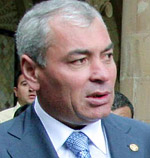The RA government has sent two draft laws on trademarks to the parliament. The first one is entitled “Geographic marking” and the second one “Trademarks”.
In fact these bills are discussed for the purpose of making the scope of trademark users in Armenia narrower. Specifically, it serves for the purpose of giving the trademark of Jermuk only to Jermuk Group company. The Jermuk Group belongs to the Arsenyan brothers, and one of the brothers, Ashot Arsenyan is a member of the RPA and MP. In fact this bill serves for the purpose of giving this monopoly to a company. By coincidence this bill was developed in the same period when PM Tigran Sargsyan started speaking of the importance of diversifying the economy and getting rid of monopolies. Generally there are many trademarks of mineral water companies in Armenia but there are no monopolies. In Jermuk city there are about 15 companies producing mineral water. Two out of the fifteen companies are the most famous producers of Jermuk. The other companies have small quantities but have their places in the market though. However the law-makers want to take these small shares from producers too. The law will be discussed at an upcoming session of the parliament.
Definitely the parliamentarians were not the one to initiate this bill and most possibly the owners of the business have done their best to do it and shared the super-profits with law-makers.
Last week we asked Ashot Arsenyan about this bill, but he told us that he did not know anything, but later added that there was no bill like that in the agenda. In fact it means that he knew about it and knew that the discussion was delayed as well. Awhile later he said that the goal of the bill was not monopolies and he was advocating for economic freedoms. Mr. Arsenyan says small companies producing Jermuk have sent a compliant letter to the president. In answer to our question why would these small companies complain if this bill if they were not aimed at taking the monopoly he said, “The letter is not about the bill. They are complaining of technical requirements,” said the MP.
The director of the other biggest producer of Jermuk mineral water Jermuk Factory Hayk Hovsepyan told us that he knows about the bill and the compliant letter submitted to the president as well, and he advocates for the proposed changes and that is why did not join the compliant letter. He says the small companies complain of the technical requirements of Jermuk production because this decision was made last year and shall be enforced in April 2010. Thus, definitely the bill has to be discussed and adopted till April in order to back the enforcement of the government’s decision. We talked to representatives of several small companies producing Jermuk, and they said that they are complaining of the technical requirements for production because as a result of this law only backed producers will be able to use the trademark of Jermuk. “In order to comply with these requirements we have to invest millions of dollars. We can’t do that, thus we will have to refuse the trademark of Jermuk. They did it on purpose to force small producers out of the market,” said the owner of a small Jermuk production company, who asked us not to publish his name.
According to the mentioned bill, the companies which fail to comply with the technical requirements will not be able to use the Jermuk trademark any more, but will be able to produce mineral water with other trademarks. If these small companies don’t use that trademark, they will not be able to survive in the market.
This may become a tradition for the government in the future and they may do the same thing whenever they want to take a monopoly, for example one day they may adopt a law that the trademark Lori can be used only by one company producing cheese.
One of the two major companies producing mineral water, the Jermuk Mother factory, belongs to former foreign minister Vardan Oskanyan’s relative and a Diaspora Armenian businessman Kaytsak Zeytlyan. This factory will continue producing Jermuk as well. By the way, H. Hovespyan told us that some of the 8 companies that export Jermuk to the Russian market don’t comply with technical requirements. This means that they want to take not only the domestic market but the exportation business as well.

